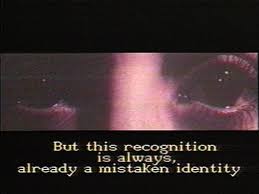One of the main things I do is look at art. There are some pretty big shows in London at the moment that are set to close in mid-January. I want to hype them because they’re quite political in subject matter, and because they’re still open [edit – they are not still open], so you can actually get a chance to see them, rather than having to just take my word for it on whether or not they were any good [edit – you can now only take my word on whether or not they were].
O’ Magic Power of Bleakness at the Tate Britain, with artwork from Mark Leckey [Closes 5th Jan]

Retrospective for Mark Leckey, who’s Scouse-accented work has this time involved recreating the motorway underpass that him and his mates used to mess about underneath when they were teenagers. So it’s a large theatrical installation with multiple video projections, like an open plan cinema hall that’s been designed and built specifically for showing just one film. Taken together, the videos have an overall runtime of just under an hour, and offer a hazy impression of youth culture in Britain since around the 1970’s – and I think they form a modestly personal, non-linear recollection of the artist’s involvement with more-or-less subversive popular cultural styles.
The cumulated affect is a decaying hallucinogenic volatility, etc., but most interesting is that, through his professionalisation as one of the world’s most successful contemporary artists, Leckey has become estranged from his class, yet still maintains a strong attachment to some of its symbolic codes. Now, his take on the working class is on its sportswear branded contingent, those who’ve designed themselves in line with a sort of subcultural visual ideology, and it is in this focus that Mark Leckey places a deeply uneasy question about class authenticity right at the centre of his work. Has the working class ever had its own culture?
If UR Reading This It’s 2 Late: Vol I at the Centre for Contemporary Arts: Goldsmiths, with artwork from Tony Cokes [Closes 19th Jan]

Retrospective for Tony Cokes, showcasing a selection of his video works from the early 90’s to now. For the most part, it’s a pretty basic set-up of texts taken from political speeches and essays relayed on primary colour backgrounds, set to tasteful selections of alternative pop music. Kodwo Eshun’s Mark Fisher memorial lecture from 2018 gets a full 40 minute treatment and is played in a nightclub-like environment, allowing the Fisher/Goldsmiths legacy to continue apace, which is very nice if you’re into that sort of thing.
Cokes’ intention is to make theoretical texts more accessible, so the artworks are unapologetically didactic. The emancipatory political potential of producing and listening to music is offered as a recurrent point. The artworks attempt to show how cultural influences shift across national and racial boundaries in the historical development of dance music styles. They celebrate the creation of temporary conditions where joyful collective experiences seem to break down ideologies that enforce types of segregation. It is very Goldsmiths.
In the basement is one of Cokes’ early video works, FADE TO BLACK, which doesn’t adhere to the colour-text-sound template. It’s an erratic 30 minute composite of found footage, quoted text, and politicized music about cinematic representations of blackness, and you should take the time to watch because it is very angry and very stylish. (An analogue to this can be found in Elia Suleiman and Jayce Salloum’s film from the same year, Introduction to the End of an Argument – https://www.youtube.com/watch?v=JI3AeaRUUhk)
Misbehaving Bodies at the Wellcome Collection, with artwork from Jo Spence and Oreet Ashrey [Closes 26th Jan]

An exhibition of text and photography from Jo Spence with videos from Oreet Ashrey in an impressively cotch watching environment (beanbags and blankets are provided). Across 40 years, Jo Spence has developed a diaristic approach to photography to reflect on how her working class background has shaped her experiences of mental and physical illness. In scrapbook style, Spence wryly criticises gendered representations of the body and links this to her own feelings of pain and dejection. To deal with some of the fallout from this, Spence developed a technique she calls photo therapy. This involved reenacting and photographing moments of struggle that she and members of her family have lived through. Photo, text, and video documentation from this experiment are featured in the exhibition.